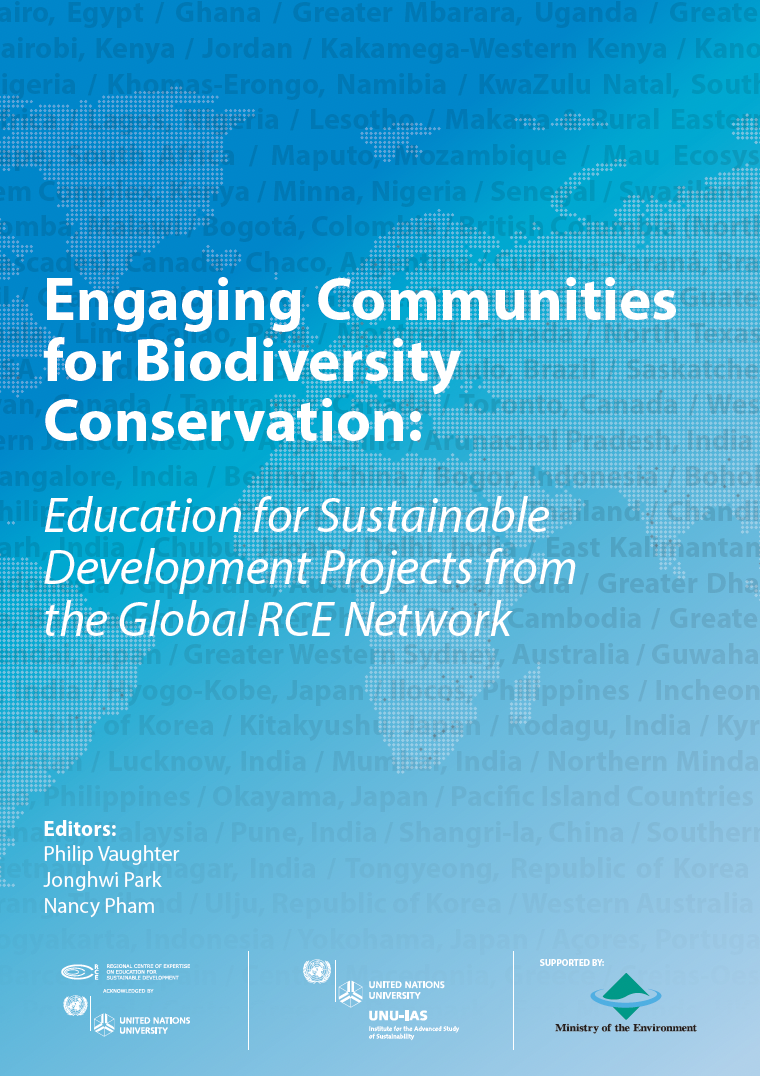RCE Biodiversity Education Projects Engage Local Communities on Ecosystem Restoration in New Publication from UNU-IAS
 A new publication from the United Nations University Institute for the Advanced Study of Sustainability (UNU-IAS) has been launched today, featuring innovative biodiversity education projects developed by Regional Centres of Expertise on Education for Sustainable Development (RCEs).
A new publication from the United Nations University Institute for the Advanced Study of Sustainability (UNU-IAS) has been launched today, featuring innovative biodiversity education projects developed by Regional Centres of Expertise on Education for Sustainable Development (RCEs).
'Engaging Communities for Biodiversity Conservation: Education for Sustainable Development Projects from the Global RCE Network' features 12 case studies from RCEs conducted during the period of the Global Action Programme (GAP) on Education for Sustainable Development (ESD) from 2015-2019.
Utilising their model of multi-stakeholder networks, RCEs worked with a variety of partners and stakeholders on biodiversity and conservation education initiatives at both local and regional levels. These education projects focused on SDG 14 (Life Below Water) or SDG 15 (Life on Land), and served to educate, engage, and spur action in communities towards the protection and restoration of ecosystems, species, and habitats.
Each biodiversity education project looks at how RCEs, in the face of local biodiversity issues and challenges, developed innovative ways to bring about action through education in their local context and region, bridging formal and non-formal education, as well as how these can be upscaled across other communities worldwide.
Some key areas addressed within the publication include:
- Land use change: A project by RCE Greater Pwani investigated the causes behind land use and land cover change in the Taita Hills region in Kenya, in order to educate stakeholders on alternatives to protect the forests’ biodiversity and surrounding communities.
- Fragmentation of habitats: Against a backdrop of urbanisation in the area, RCE Greater Western Sydney conducted a study to confirm urban platypus presence (an umbrella species for waterway health) in the Hawkesbury-Nepean River in Australia and protect their habitat. Following the development of a hydroelectric power plant, RCE Curitiba-Paraná worked with low-income riparian and fishers’ communities in a key river basin in Brazil, educating communities on how to minimize and manage contact with freshwater stingrays, a species whose habitat and distribution had been altered by the development.
- Habitat rehabilitation: RCE South Rift worked to document the Maasai community’s Indigenous knowledge of native floral species, which contributed to guiding restoration processes. This was incorporated into the training developed by the RCE on conservation practices to address deforestation.
- Conservation of vascular plant species: RCE Zaria trained local youth in monitoring the distribution and health of endangered native plant species, information which was essential for the creation of guidelines to protect these species. Participants gained skills in mapping and received advocacy training, which has allowed them to upscale education and public awareness in the region. RCE Helsinki Metropolitan worked to educate students by transforming their learning environments – native plants were brought into the schoolyard, which increased awareness of native biodiversity and also served to create connections with nature. The RCE also worked to create curriculum and train teachers on how to transform areas such as school gardens or forests into learning spaces.
- Restoration of mangrove ecosystems: RCE Sundarbans worked with local Indigenous communities to create training programmes for the aquaculture sector on a traditional knowledge-based and sustainable method, ‘Community Based Mangrove Agro-Aqua-Silvi-Culture’ (CMAASC), an alternative practice to commercial shrimp cultivation. RCE Cebu worked to establish conservation initiatives through a rehabilitation programme for the mangrove forests along the coast of Cadiz City in the Philippines, which focused on tree plantings, and included training and workshops for community members.
Other projects included: RCE Tongyeong educated learners on their impact on the natural environment through experiential activities within an Eco Study Trip, across five programmes (themes: Marine, Forest, Climate Change, Sunlight, and Water); RCE Warsaw Metropolitan used both formal and non-formal education to raise awareness and change behaviours among the city’s urban residents, by focusing on the importance of the Kampinos National Park in Warsaw, Poland, and its role in critical ecosystem services; RCE Guatemala trained university professors on strategies of experiential learning that connect to traditional knowledge, with the aim of understanding and conserving the rivers and overall water resources in the country; and RCE Saskatchewan provided an environment for students, guests, and researchers to develop their skills and research in sustainability, conservation and resource management, and provide visitors with hands-on activities involving water resources, forestry, botany, and wildlife.
The projects demonstrate the diversity of partners an RCE project brings together, and the power of collective action when working together to protect the biodiversity within a region. Readers are also provided with suggested actions they can take, in order to start or scale up practices in their communities in order to protect the species, habitats, and ecosystems within their region, based on the experiences of the RCEs.
As Dr. Philip Vaughter (Research Consultant, UNU-IAS), notes, "While the Anthropocene extinction is a global event, all interventions to stop it need local actors to implement appropriate solutions to protect the ecosystems and constituent biodiversity in their regions." These RCE projects highlight the transformative role that education can play in every community, to address biodiversity decline, and to realise sustainable development.
View or download the publication here.
A video featuring a number of RCE Biodiversity projects from the publication can also be viewed here.
To find out more about the Global RCE Network, please visit the RCE Portal: https://www.rcenetwork.org/portal/


